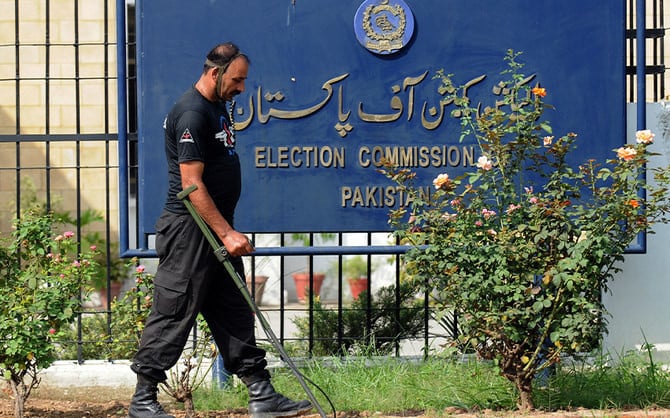The Election Commission of Pakistan (ECP) on Tuesday began the process of reallocating those seats to other parliamentary parties after refusing the Sunni Ittehad Council (SIC), a group of lawmakers supported by the PTI, the reserved seats for women and minorities in the National Assembly, Express News reported.

Three reserved seats for minorities in the National Assembly have been given to Jamiat Ulema-e-Islam-Fazl (JUI-F), Pakistan Muslim League-Nawaz (PML-N), and Pakistan Peoples Party (PPP), according to notifications released by the ECP.
The three minority seats in Khyber-Pakhtunkhwa have been divided among the parliamentary parties, with PML-N, PPP, and JUI-F obtaining one seat apiece.
Moreover, notifications on women’s reserved seats in the Sindh Assembly have been released by the ECP. Notably, the reserved seats for women have been awarded to MQM-P’s Fouzia Hameed and PPP’s Sumeta Afzal Syed.
Sadhumal Surendar Valasai of the PPP was awarded the Sindh Assembly’s reserved seat for minorities, and there are rumors that further reserved seats would be assigned shortly as well.
The SIC was not given reserved seats by the ECP one day earlier since it had not provided a “priority list” for the seats before the votes.
On December 22, 2023, the ECP stripped the PTI of its election emblem, the cricket bat, due to anomalies in its internal elections. Just a few weeks before the general elections on February 8, on January 13, the Supreme Court upheld this ruling.
The party’s candidates had to run as independents in last month’s elections since they were unable to submit their priority list for reserved seats to the ECP because they did not have an electoral symbol.
The PTI-backed candidates joined obscure SIC because independent candidates are required to join a political party three days following the declaration of the official election results.
Later, the SIC requested reserved seats in the National Assembly and provincial legislatures from the ECP in proportion to its general seats. Following hearing arguments, a five-member ECP panel led by Chief Election Commissioner Sikandar Sultan Raja last Thursday reserved its decision regarding the case.
SIC is not allowed to claim quota for reserved seats for women and non-Muslims, according to an order released by the ECP on Monday. This is because the SIC has non-curable legal faults and has violated the law by failing to submit a priority list for restricted seats.
Babar Hassan Bharwana, the ECP member for Punjab, disagreed with the majority ruling, even going so far as to give other political parties in the assembly the remaining reserved seats.
“In my view, reserved seats will be distributed to the political parties based on the total number of general seats each party has won in the National Assembly from the relevant province, or such reserved seats won by each party in the provincial assembly,” as stated clearly by Articles 51 (6-d) and 106 (3-c) of the Constitution.
“Therefore, until parliament makes any such amendment to Article 51 or 106 of the Constitution, these seats shall remain vacant,” he continued.










































